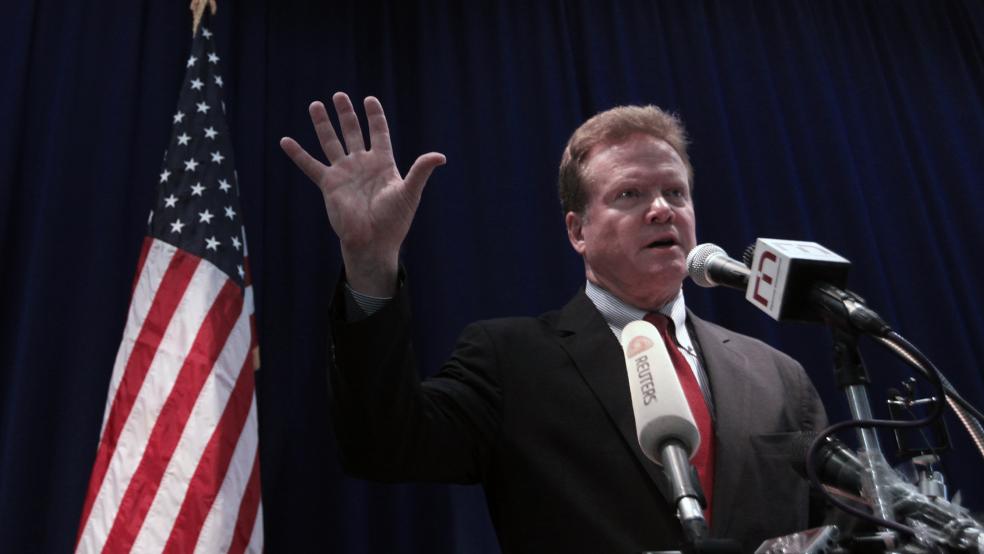Jim Webb, the one-term former U.S. senator from Virginia who is making a long-shot bid for the Democratic presidential nomination, is now considering a run as an independent. That’s bad news for one of the major parties, and it isn’t Webb’s.
In Democratic circles, the news barely merits a raised eyebrow. Webb is polling in the low single digits in the primary race, and has, so far, mounted a fairly subdued campaign. In a primary battle where fundraising totals are well into the tens of millions for the frontrunners, Webb hasn’t raised even $1 million.
Related: Here’s Why Biden Should Stay Out of the Race
For Republicans, though, the prospect of Webb in the race this time next year will cause some heartburn.
Webb, who is expected to discuss a possible independent run in a speech at the National Press Club in Washington on Tuesday morning, was never an obvious fit in the Democratic Party. A former Marine infantry officer decorated for valor in Vietnam, he served as an assistant secretary of Defense and then as secretary of the Navy under President Ronald Reagan. He is a vocal advocate of a strong national defense in general, and a powerful U.S. military in particular.
Webb has taken stands on issues such as affirmative action, gun rights and women in the military that seem to place him more in line with conservative values than with the liberal mainstream of the Democratic Party.
Were Webb to go through with it and run as an Independent, the impact on the Democratic Party’s eventual nominee would likely be trivial. For many voters unfamiliar with Webb, their introduction to him was likely the Democratic presidential debate held last week in Las Vegas. Webb’s most memorable contribution to the event was frequent complaints about not being given enough time to talk. He wasn’t wrong —Hillary Clinton and Bernie Sanders were given much more time than any of the other candidates — but he came across as petulant in the eyes of many viewers.
Related: It’s Not Just the Rich Who Would Be Hit by Sanders’ Tax Hikes
Webb’s performance in the debate was parodied over the weekend on “Saturday Night Live.” Alec Baldwin, in character as Webb, frequently complained about not being given enough time to talk. But when he was questioned about some of his more controversial positions he would look flummoxed for a moment before declaring, “Pass.”
Depending on how the Republican primary plays out, though, Webb could be a real problem for the GOP.
Related: Donald Trump – I Would Have Prevented 9/11 Attacks
Given the demographic realities of the U.S. electoral map, there just isn’t a lot of room for error for any Republican candidate looking to win the presidency. If Donald Trump continues to lead the pack, a lot of conflicted Republican voters will be looking for a reason not to cast their ballots for a former reality television star who, many of them believe, is not worthy of their vote.
It’s likely that a vanishingly small portion of those voters would cast a ballot for a candidate like Hillary Clinton or Bernie Sanders. But a Jim Webb candidacy might offer an acceptable alternative for conservatives unwilling to support Trump.
Would Webb peel off a large segment of conservative voters? Probably not. But to create serious problems for the GOP, he wouldn’t have to. Most analyses of the electoral map for 2016 give the Democrats a substantial advantage. The University of Virginia’s Center for Politics, for example, says the Democrats have something on the order of 247 electoral votes — out of the 270 needed — in fairly safe states. Republicans, by contrast, have only about 206.
That leaves 85 votes in swing states, and Democrats only need 33 of them. In a toss-up state like Virginia, where Webb won a Senate seat in a statewide election and which has a large proportion of retired military voters, it’s not hard to see him pull enough votes away from Trump, or many other GOP candidates, to throw the state’s crucial 13 votes to the Democrats.
So ironically, when Webb floats the idea of an independent run, it probably won’t be the members of his own party sweating, but rather the folks at the Republican National Committee.





